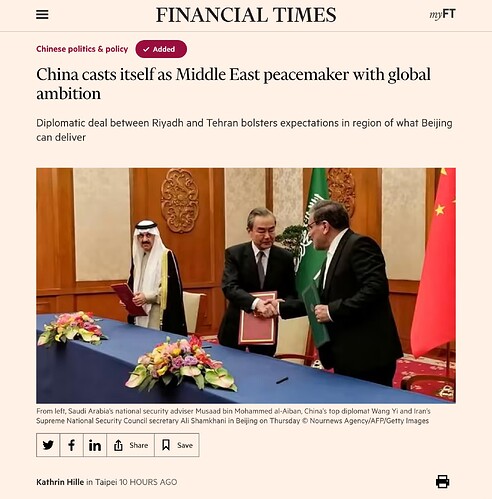-
习近平最近促成了伊朗和沙特阿拉伯之间的和解,这让中东和华盛顿的许多人感到惊讶。
-
这一外交突破揭示了美国在该地区力量的局限性,以及中国在全球治理中承担更多政治角色的潜在意愿。
-
中国专家认为,伊朗与沙特的缓和是中国与中东关系的一个潜在转折点。
-
中国历来是中东地区的经济伙伴,该地区30%的石油出口来自中国,而沙特阿拉伯是中国最大的贸易伙伴。
-
中国是少数几个与伊朗保持健康关系的大国之一,自1980年以来与美国没有正式外交关系。
-
这使中国在中东地区的贸易伙伴和投资来源方面具有相当大的影响力。
-
中国国家主席习近平12月在利雅得出席了与阿拉伯国家领导人的峰会,上个月在北京接待了伊朗总统易卜拉欣-拉伊西。
-
中东国家希望中国能够帮助解决安全问题。
-
北京日益增长的外交野心被认为是对美国在中东地区霸主地位的挑战。
-
这项交易是在沙特阿拉伯和美国总统拜登的政府之间关系紧张的情况下达成的。
-
海湾国家已经注意到,他们的传统伙伴已经脱离了该地区。
-
沙特王储穆罕默德-本-萨勒曼一直奉行自信的外交政策,在王国与华盛顿的关系和与中国及其他亚洲大国日益增长的关系之间取得平衡。
-
中国被认为是帮助解决中东安全问题的潜在伙伴。
-
它日益增长的外交影响力被视为对美国在该地区的优势地位的挑战。
-
沙特阿拉伯正在平衡其与美国的传统关系和与中国及其他亚洲大国日益增长的关系。
-
美国外交官认为,中国正在利用美国外交和安全政策从中东向印太地区的转变。
-
中国以美国霸主的良性替代者自居,并邀请各国加入 "一带一路 "倡议的朋友圈。
-
由于沙特阿拉伯和伊朗之间正在进行的竞争,分析家们对该协议的持久性提出质疑。
-
利雅得和德黑兰对也门和黎巴嫩的敌对派别的支持可能会给协议带来压力。
-
拜登承诺,美国不会走开,留下一个真空,由中国、俄罗斯或伊朗填补。
-
分析家们对沙特和伊朗之间的协议的可持续性提出了疑问。
-
北京多次提出模糊的中东和平建议,解决以巴冲突、叙利亚危机和整个地区的新安全架构。
-
外交政策专家认为,中国的外交官太少,无法将其笼统的声明转化为实质性的外交活动。
-
中国可能试图在中东效仿俄罗斯,成为 “西方倡议的破坏者”。
-
在12月的沙特之行中,习近平提出了从健康到国防对话等协议。
-
中国安全分析家认为,美国在中东的影响对中国构成风险,并可能影响北京的政策。
-
中国不愿意在中东地区与美国竞争,但有毒的双边关系可能会迫使它这样做。
-
中国唯一的海外军事基地在吉布提,与阿拉伯半岛仅隔一个狭窄的海峡。
-
在该地区扩大能源以外的联系有很多好处。
-
中国的中东政策实际上正处于一个十字路口。
-
Xi Jinping recently brokered a rapprochement between Iran and Saudi Arabia, which surprised many in the Middle East and Washington.
-
This diplomatic breakthrough reveals the limits of US power in the region, and China’s potential willingness to assume a more political role in global governance.
-
Chinese experts view the Iran-Saudi detente as a potential turning point in China-Middle East relations.
-
China has traditionally acted as an economic partner in the Middle East, with 30% of the region’s oil exports coming from China, and Saudi Arabia being its largest trading partner.
-
China is one of the few major powers to have healthy relations with Iran, with no formal diplomatic ties with the US since 1980.
-
This has given China considerable clout as a trading partner and source of investment in the Middle East.
-
Chinese President Xi Jinping attended summits with Arab leaders in Riyadh in December and hosted Iranian president Ebrahim Raisi in Beijing last month.
-
Middle Eastern countries are hoping that China can help solve security problems.
-
Beijing’s growing diplomatic ambition is seen as a challenge to US supremacy in the Middle East.
-
The deal comes at a time of testy relations between Saudi Arabia and US President Joe Biden’s administration.
-
Gulf states have noted that their traditional partner has been disengaging from the region.
-
Saudi Crown Prince Mohammed bin Salman has been pursuing an assertive foreign policy, balancing the kingdom’s ties to Washington with its growing relationships with China and other Asian powers.
-
China is seen as a potential partner to help address security issues in the Middle East.
-
Its growing diplomatic influence is viewed as a challenge to US supremacy in the region.
-
Saudi Arabia is balancing its traditional ties to the US with its growing relationships with China and other Asian powers
-
US diplomat believes that China is exploiting the shift in US foreign and security policy from the Middle East to the Indo-Pacific.
-
China has presented itself as a benign alternative to US hegemon and has invited countries to join the Belt and Road Initiative’s circle of friends.
-
Analysts have questioned the agreement’s longevity due to the ongoing competition between Saudi Arabia and Iran.
-
Riyadh and Tehran’s backing of rival factions in Yemen and Lebanon could put strains on the deal.
-
Biden has pledged that the US will not walk away and leave a vacuum to be filled by China, Russia, or Iran.
-
Analysts have raised questions about the sustainability of the agreement between Saudi Arabia and Iran.
-
Beijing has repeatedly floated vague Middle East peace proposals addressing the Israeli-Palestinian conflict, the Syria crisis and a new security architecture for the entire region.
-
Foreign policy experts argue that China has too few diplomats to transform its sweeping statements into substantive diplomacy.
-
China could try to emulate Russia in the Middle East as “a spoiler for western initiatives”.
-
On his trip to Saudi Arabia in December, Xi proposed agreements ranging from health to defence dialogue.
-
Chinese security analyst believes US influence in the Middle East poses a risk to China and might shape Beijing’s policy.
-
China is reluctant to compete with the US in the Middle East, but the toxic bilateral relationship might force it to do so.
-
China’s only overseas military base is in Djibouti, just across a narrow strait from the Arab peninsula.
-
The advantages of broadening ties its in the region beyond energy are numerous.
-
China’s Middle East policy is actually at a crossroads.
